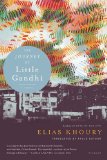Normally, “fog of war” refers to the ambiguity and confusion encountered by military men, from commanders through ground soldiers, combatants during a war or battle. Yet the fog can envelop more than the military. There is also a fog of uncertainty and confusion in a city under siege or its inhabitants. Lebanese novelist Elias Khoury takes readers to that level in The Journey of Little Gandhi, a view of the life of average individuals in Beirut during the Lebanese civil war.
 Khoury’s style creates that fog of war sense. The pivot point of the story is Little Gandhi, or Abd Al-Karim, a shoe shine who is shot down in the street when the Israeli Army entered the city in September 1982. Much of his story — and that of many others — is relayed by Alice, an aging prostitute who is actually the main subject in which the narrator is interested. At least 30 different characters make an appearance, from an American University professor to an Episcopal priest to drug traffickers to Alice and Little Gandhi.
Khoury’s style creates that fog of war sense. The pivot point of the story is Little Gandhi, or Abd Al-Karim, a shoe shine who is shot down in the street when the Israeli Army entered the city in September 1982. Much of his story — and that of many others — is relayed by Alice, an aging prostitute who is actually the main subject in which the narrator is interested. At least 30 different characters make an appearance, from an American University professor to an Episcopal priest to drug traffickers to Alice and Little Gandhi.
This melange means that regardless of whose particular story is being told at the moment and who may be relating it, we are presented a kaleidoscopic, multi-layered tale. One story flows into another story, akin to a person’s thought process moving unconsciously from one topic to another to another. Likewise, these stories can be firsthand accounts or hearsay four times removed. Just as in war and its aftermath, the truth, such as it is, can be difficult to discern. Yet this also presents difficulty for many readers.
By necessity, Khoury’s literary approach is confusing or labyrinthine, with no consistent linear narrative. To the contrary, The Journey of Little Gandhi is structured so as to render the narrative unstable and ambiguous. Yet that is the essence of the fog of war. Differing reports come from differing people. Motives and movements are confused. Uncertainty and confusion impact lives and decisions. That is exactly what is happening to the people of Beirut in Khoury’s tale. It is a city split between and among factions. “Everything in it fell apart.” So, rather than just wars and rumors of war, Khoury is telling us of lives and even rumors of life.
Originally published in Arabic in 1989, the book, translated by Paula Haydar, was published in the U.S. in 1994. Those familiar with Western categorizations of genres may call the book, now in newly released trade paper edition, so-called “magical realism.” Khoury, however, rejects that classification. There is no need for magical realism in Lebanese literature, he told one interviewer, because life in Lebanon was itself unreal and fantastic. In such circumstances, he says, literature “must put together two elements: seeing and inventing; it must tell the truth and lie; it must combine the real and the fantastic at the same level and at the same moment.”
The Journey of Little Gandhi certainly does that as it takes us on journey through recent Lebanese history. The question is whether readers will take the time on the journey to peel back the layers and try to grasp both reality and unreality.
This is the city of nothingness
Elias Khoury, The Journey of Little Gandhi







